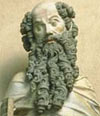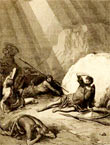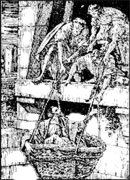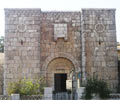Two Different Pauls in Epistles and Acts – plus an Extra, Saul !
Saul of Tarsus – a witness for Jesus?
One is informed by Acts that St Paul’s early day stance was as “Saul, the Christian persecutor“. Yet if Saul really was a vigilante for orthodox Judaism at the time of Stephen’s stoning (Acts 7.58-8.3), becoming the chief persecutor of Christians, no less – one wonders just where was Saul, not long before, when a supposed radical rabbi called Jesus was stirring up whole towns and villages?
Paul’s role as religious policeman seems not to have awakened until shortly after the godman’s death. But in itself this suggests Jesus of Nazareth had no great impact. After all, Saul was a contemporary of Jesus in time and place, raised in Jerusalem (“at the feet of Gamaliel” – Acts 22.3) at precisely the time the godman was overturning moneychangers in the Temple and generally provoking Pharisees and Sadducees.
Would not Saul, a young religious hothead (“exceedingly zealous of the traditions” – Galatians 1.14) have waded into those multitudes to heckle and attack the Nazarene himself? Would he not have been an enthusiastic witness to JC’s blasphemy before the Sanhedrin? And where was Saul during “passion week“, surely in Jerusalem with the other zealots celebrating the holiest of festivals? And yet he reports not a word of the crucifixion?
Paul, another “witness for Jesus”, saw and heard nothing!
Two Pauls – One Illusion
The trail-blazing Christian missionary and apostle, St Paul, appears nowhere in the secular histories of his age (not in Tacitus, not in Pliny, not in Josephus, etc.) Though Paul, we are told, mingled in the company of provincial governors and had audiences before kings and emperors, no scribe thought it worthwhile to record these events. The popular image of the saint is selectively crafted from two sources: the Book of Acts and the Epistles which bear his name. Yet the two sources actually present two radically different individuals and two wildly divergent stories. Biblical scholars are only too familiar with the conundrum that chunks of Paul’s own story, gleaned from the epistles, are incompatible with the tale recorded in Acts but live with the “divine mystery” of it all. Perish the thought that they might recognize the whole saga is a work of pious fiction.
Acts
The Paul of Acts is a team player. His conversion on the road to Damascus is so important that it is repeated three times (son et lumiere). From a previous state of error (as “Saul”, the persecuting Jewish zealot) he is brought into the loving embrace of the fledgling church.
Now part of the brethren (“with them coming in and going out at Jerusalem” – 9.28), he is “managed” by the elders. Disciples “took him” from Damascus (9.25) and Barnabas “brought him” to the apostles (9.27). They “brought him” to Caesarea and then they “sent him” to Tarsus. Barnabas “brought” Paul back to Antioch (11.26) and then with him was “sent” to Jerusalem with famine relief (11.30) – (as it happens, a visit to Jerusalem completely unknown to Paul himself).
Eventually the brethren “send” Paul on his first missionary journey (13.4). As a missionary, Paul is very much on the collective message:
“And as they went through the cities they delivered them the decrees for to keep that were ordained of the apostles and elders which were at Jerusalem. And so were the churches established.” – Acts 16.4,5.
From Thessalonica, Paul is “sent away” to Berea by the brethren (17.10). He is also “sent away” by sea and “brought” to Athens (17.14,15). In Cenchrea, Paul even takes a Jewish vow and shaves his head! (18.18).
Though his name is cited in Acts 177 times, “Paul” is never coupled with the familiar honorific “apostle”. The closest Acts comes to bestowing the title is 14.14 where his name follows Barnabas and the plural is used. In every other instance, Paul is an entity quite separate from, and implicitly subordinate to, the apostles. The slight is striking, given that Acts was supposedly written by Luke, Paul’s companion and admirer.
Epistles
In stark contrast, the Paul of the Epistles is a bombastic maverick, representing no one but himself and under no one’s direction. It is Paul who is doing the directing. Full of his own importance, in all his letters Paul hammers home the point that he is an apostle and that his appointment comes directly from the divine. His “proof” of this is his own success as a missionary (e.g. 2 Corinthians 2,3) – an argument of dubious merit still used by churches today. Look at our success! We must be right!
Paul makes no reference to a “Damascene road” conversion nor to an origin in Tarsus (Jerome reported that Paul was from Galilee!). He makes no reference to Cyprus and the battle with a rival magician, nor does he refer to the edict from James on food prohibitions and fornication. Paul, it seems, owes nothing to any man. A bad-tempered bully, he wastes little sympathy on those who do not accept his point of view. Thus when he loses the support of Peter and Barnabas over eating with Gentiles, Paul rebukes Peter publicly and writes that he has reneged out of “fear” and Barnabas has been naively “carried away” (Galatians 2.12,13).
The Implausible Paul
It is curious that no Jewish rabbinic writings of the 1st or 2nd century so much as mention a renegade student of Gamaliel who, having studied under the master and vigorously enforced orthodoxy on behalf of the high priests, experienced a life-changing vision on an away mission. Not a word emerges from the rabbis about the star pupil who “went bad”, a heretic who scrapped the prohibitions of the Sabbath, urged his followers to disregarded Judaism’s irksome dietary regulations, and pronounced the Law and circumcision obsolete. Surely such a renegade could not have completely escaped the attention of the scribes?
How likely is it that Paul really studied under the Pharisaic grandee (Acts 22.3)? Paul clearly had difficulty with the Hebrew language: all his scriptural references are taken from the Greek translation of Jewish scripture, the Septuagint.
How likely is it that, as a young man, Paul – supposedly a Roman citizen and from the Hellenised diaspora – even got the job as chief policeman of the ultra-orthodox of Jerusalem? And if Paul really had secured such a position, he surely would have had far bigger fish to fry than a miniscule “Jesus group” in Damascus. We are told in Acts that the apostles continued to preach in Jerusalem even after the death of Stephen (“They all scattered abroad … except the apostles.” – Acts 8.1,2). So why didn’t Paul go for the ringleaders, closer to hand?
“Nothing in his letters suggests that Paul had any official standing in his treatment of Christians … Hence, in opposition to what Luke says, he could not have used arrest, torture or imprisonment as a means of forcing Christians to recognize that they had been misled.” – Murphy O’Connor, Paul, His History, p19.
Given that the Jewish High Council (the Sanhedrin) had no authority to empower a heresy hunter to operate in the independent city of Damascus, Paul’s road trip is even more implausible.
Convert?
How likely is it that Saul/Paul converted within a year or two of the crucifixion (Irenaeus says eighteen months)? If he truly was a precocious zealot of Judaism and was completely untouched by the perambulations and miraculous deeds of the godman himself – short of the supposed blinding “miracle” – why would he, of all people, so readily embrace the heresy? The four Gospels neither mention nor even hint at a pioneering apostle called Paul.
There is also a curious parallel between the alleged “persecution” speech spoken by the celestial Christ to the blinded Paul (“Saul, Saul … “) and the persecution of Dionysius found in Euripides work “the Bacchae” – and both use the word “goads”.
If Paul (Saul) really had apostatised to the extent of joining (or establishing) a radical new sect, how is it the rabbis did not anathematize his name? To be sure, Jewish Christians (Ebionites) did condemn Paul and did so in the harshest terms – even suggesting that in reality he had been a malcontented Greek convert, whose ardour had been rejected by the High Priest’s daughter! (Epiphanius, Panarion, 16). But that was in the 2nd century, long after any life and death of the apostle.
The “persecution” of the early church seems an extraordinarily unlikely construct because once Saul, the “destroyer of the saints”, transforms into Paul the apostle, and is whisked away by the brethren to safety in Caesarea and home to Tarsus, the persecution abruptly stops. The “persecution” is entirely a one man circus.
” Then had the churches rest throughout all Judaea and Galilee and Samaria, and were edified; and walking in the fear of the Lord, and in the comfort of the Holy Ghost, were multiplied.” – 9:31
The entire pre-Christian “Saul, the scourge of the church” makes no sense at all as history – but does make a great deal of sense as theology. “Zealous Jew sees the light of Jesus, becomes Christian.” The theological purpose is as obvious as the historical vignette is bogus.
Where DID they get their ideas from? Josephus was himself betrayed by ‘John’, chose an ally named ‘Silas’, and made a miraculous escape! |
” But when John [of Gichala] was come to the city of Tiberias, he persuaded the men to revolt from their fidelity to me … A messenger had come to me from Silas, whom I had made governor of Tiberias … Upon the receipt of this letter of Silas, I took two hundred men along with me, and traveled all night … Having dismissed the guards I had about me, excepting one, and ten armed men that were with him, I attempted to make a speech to the multitude … But before I had spoken … to provide for my own safety, and escape my enemies there … [I was] carried upon the back of one Herod of Tiberias, and guided by him down to the lake, where I seized a ship, and got into it, and escaped my enemies unexpectedly, and came to Tarichese.” – Josephus, Life 17 |

“But Paul thought not good to take John with them, who departed from them from Pamphylia …
And Paul chose Silas, and departed, being recommended by the brethren unto the grace of God.– Acts 15.38,40
” And at midnight Paul and Silas prayed, and sang praises unto God: and the prisoners heard them.
And suddenly there was a great earthquake, so that the foundations of the prison were shaken: and immediately all the doors were opened, and every one’s bands were loosed.
And the keeper of the prison awaking out of his sleep, and seeing the prison doors open, he drew out his sword, and would have killed himself, supposing that the prisoners had been fled.
But Paul cried with a loud voice, saying, Do thyself no harm: for we are all here. Then he called for a light, and sprang in, and came trembling, and fell down before Paul and Silas”.
– Acts 16.25,29
“Murderous Jews” of Damascus
How likely is Paul’s “escape by basket” from the city of Damascus (Acts 9.25) ? Typically, baskets lowered by rope are used by tenement dwellers to buy bread from street vendors, first lowering the basket with payment then raising the basket with their loaf. But man-sized baskets? And why could not Paul just climb down the rope like a normal person?
And just who was Paul escaping from? According to Paul’s “own” testimony (2 Corinthians 11.32,33) it was “the governor under Aretas the king”. Aretas IV was the Nabataean monarch who ruled a vast area from his capital of Petra, though Paul gives no explanation as to why Aretas was out to get him.
But Acts, consistent with its hostility to “the Jews”, tells us it was Jews of murderous intent (Acts 9.23,24). Why were the Jews so murderous? Any reputation Paul had among the Jews of Damascus would have been as an enforcer of Judaism, not as a Christian heretic. The weak explanation offered by Acts is that the converted Saul had “confounded” the Jews in the synagogue with his Christ. Apparently, that was sufficient cause for them to organise the intended assassination and watch the city gates (and there were at least seven of them) “day and night” – a considerable investment of manpower. O’Connor asks the reasonable question:
“Why should the Jews watch the gates, when it would have been perfectly easy to find out where Paul was living and arrange an ‘accident’ there?”
– O’Connor, A Critical Life, p6.
Faced with such hostility from his erstwhile co-religionists, how plausible is it that Paul, having just experienced a life-changing conversion, instead of joining the earthly companions of his newly acquired Lord, instead goes off to “Arabia” for three years – an “Arabia” that has just chased him out of Damascus?!
Surely he would seek safety with fellow Christians? Surely he would wish to speak with his Saviour’s still living mother, visit the places where Jesus wrought his miracles, tread the path to Calvary and ponder on the spot where his Lord suffered his passion? (Could it be that Paul does NOT do any of these things because virgin birth, miraculous deeds and earthly crucifixion have not yet been added to the story??!!)
Council of Jerusalem?
Acts 15 reports that Paul’s “long abode” at Antioch which followed his first missionary journey is interrupted by “legalizers” from Judaea who insist that salvation required circumcision. The brethren are alarmed and Paul and Barnabas are chosen to lead a delegation to Jerusalem to meet the apostles and elders. The meeting is the famed “Council of Jerusalem“. Conventionally dated anywhere between the years 48 and 52, Acts reports a pretty harmonious get together, with the main issue readily resolved. Paul regales the brothers with tales of “miracles and wonders” among the gentiles (15.12) and James rules that as far as circumcising the Gentiles is concerned, “we trouble them not” (15.19). Back in Antioch, the brethren “rejoiced” (15.32).
Yet Paul’s own report on the meeting with “those who seemed to be the pillars” is very different. He goes to Jerusalem as a result of his own “revelation” (Galatians 2.2) and records what is actually a confrontation.
If there really was a “Council of Jerusalem” at which Paul won the argument that Gentiles did not need to be circumcised why did Paul so soon afterward personally circumcise Timothy, a disciple he found in Lystra? (16.3) To be sure, Timothy we are told is a half Jew so an apologetic argument is that it was to “gain acceptance” by the Jews of the region but such an argument presupposes a huge public awareness of poor Timothy’s genitals. (There’s no hint that Timothy was even asked how he felt about it!) But even more curious is what Paul himself says. Paul specifically declares that, not Timothy, but his other Greek sidekick Titus, was not circumcised!
“Yet not even Titus, who was with me, was compelled to be circumcised, even though he was a Greek. This matter arose because some false brothers had infiltrated our ranks to spy on the freedom we have in Christ Jesus and to make us slaves.” – Galatians 2.3,4.
“False brothers”, “spies”, are trying to make Paul and his entourage “slaves”?!
Such love, such Christian fellowship.
Where DID they get their ideas from? Circumcision NOT necessary – says Josephus! |
” At this time it was that two great men, who were under the jurisdiction of king Agrippa, came to me out of the region of Trachonius, bringing their horses and their arms, and carrying with them their money also. And when the Jews would force them to be circumcised, if they would stay among them, I would not permit them to have any force put upon them, but said to them, “Every one ought to worship God according to his own inclinations, and not to be constrained by force; and that these men, who had fled to us for protection, ought not to be so treated as to repent of their coming hither.“ – Josephus, Life 23 |

“And certain men which came down from Judaea taught the brethren, and said, Except ye be circumcised after the manner of Moses, ye cannot be saved.
And after they had held their peace, James answered …
Wherefore my sentence is, that we trouble not them, which from among the Gentiles are turned to God.“
– Acts 15.1,19
Founder of Churches?
More oddities exist. Paul supposedly established the church at Ephesus (Acts 18.18ff; 19.5,7), spending more time with his acolytes in that city than anywhere else (three months during the second mission, three years during the third). We are encouraged to believe that Paul’s first and second “Letters to the Corinthians” were written from Ephesus, and that it was here that Paul received troubled delegates from Corinth and presided over Christianity’s first book burning (Acts 19.19).
Yet it was the apostle John, settling in Ephesus after the crucifixion, who was ever after credited as founder of the Ephesian church. At the behest of Jesus himself, the Blessed Virgin had been placed in John’s care and it seems off they had traipsed to Ephesus. Here Mary’s house had been lovingly built by John with his own hands – a house which is is to be seen to this very day!
John was also said to have been the teacher of the venerable Bishop Polycarp, at nearby Smyrna. Whereas Mary’s ultimate fate was not dreamed up for centuries, according to 2nd century Irenaeus (quoted by Eusebius, 23) John remained in Ephesus until the time of Emperor Trajan (98-117) and, according to 3rd century Dionysius of Alexandria, had not one but two Ephesian tombs.
Thus the story has it that the apostle John was a long-term resident in the very city evangelised by Paul on his second journey, “popularly” supposed to have begun in the year 49.
Yet for all the overlap in time and place, Paul neither met Mary nor consulted with fellow apostle John. Curious, to say the least.
Just what is going on here: mutual ignorance, churlishness, hostility – at the heart of the church of love?
Reality Check
What we are dealing with are two distinct (and rival) traditions, one centred on the collective of the apostles and underscoring the leadership of Peter (and hence Roman Catholicism); the other starring the apostle Paul, the pioneering theological genius and founder of churches. And for whom does “Paul” speak? Why, the faction that lost the political struggle – the church of Marcion, the very person who first “discovered” the epistles of Paul in the mid-to-late 2nd century.
In their original form (from the pen of the Marcionites) the Pauline epistles were far too dualistic and gnostic for a “mass market”, with a theology which embraced escape from the material world. But they provided useful tales of the Holy Spirit at work among the Gentiles. The core Pauline (Marcionite) theology of individual salvation – “justification by faith” – severed the attachment to an exclusive Jewish bloodline and dispensed with the irksome dictates of Mosaic law. Initially alarming to the Jewish element of Catholicism, geopolitical developments would soon make such a theology very appealing.
The protracted struggle between the pro- and anti- “Jewish” Christian factions of the first half of the 2nd century ended after the Bar Kosiba war of 130-135 and the opprobrium in Rome of all things Jewish. In a half-baked fashion, the two “traditions” came together. The book of Acts was a Catholic triumph, which cut Paul down to size and brought the hero of the Marcionites into the securing arms of would-be orthodoxy.
To be sure, Paul himself was “glorified” and credited with extensive missionary activity, replete with miracles quite unrecorded in the eponymous letters. But in the new story, Paul writes no epistles. Instead, he delivers one from the top dogs in Jerusalem! In a weakly thought out story the “leader” of the Jerusalem apostles is moved to Rome ahead of Paul, and is placed upon the “pope’s” chair. Paul, the superstar of a fabricated 1st century evangelical crusade, would ever after stand awkwardly at the shoulder of a far flimsier creature fashioned by the church in Rome – St Peter.
Thus was Paul, erstwhile hero of the heretics, refashioned into the “13th apostle” and assimilated into the Catholic collective, even as the Marcionite churches were being integrated into the greater and universal Roman church. The epistles ascribed to Paul – too useful and too popular to be erased from the record – were expropriated and doctored for the Catholic cause and augmented by others composed by the Catholic ecclesia.
These so-called “pastoral” epistles, addressed to the pastors or “shepherds” of the flock, reined in maverick and independent clergy and underscored episcopal authority. Nascent Catholicism, organizing itself in Rome, was very much of this world, and saw its future glory in accommodation with the imperial order. The approved “canon” followed, closing the door on further creative theology.
The fabricated Paul
“As we said before, so say I now again, if any man preach any other gospel unto you than that ye have received, let him be accursed … For I neither received it of man, neither was I taught it, but by the revelation of Jesus Christ.” – Galatians 1.9,12.
A Catholicised sainthood was the ultimate fate of our hero Paul but from where did the super-apostle arise? If, as seems likely, Marcion created what would become the New Testament Paul as a messenger for his own ideas, he almost certainly used biographical material from his own life, particularly the power struggle he waged with the collective in Rome. Marcion, like “Paul”, alone knew the truth, a mystery made manifest to him by revelation.
As a shipping magnate from Sinope (a Black Sea port, a hundred miles north of Galatia) Marcion enjoyed financial independence and was able to travel extensively. At one point he even financed the church in Rome before being excommunicated and returning to the east. He would have been familiar with the sea lanes and attendant dangers that figure so prominently in the Pauline story. To give his theology added “authority” it had to be back projected into an earlier “apostolic age”. He may have chosen the name Paul (meaning “small” or “humble”) as reflective of his own position.
When Catholicism commandeered Marcion’s creation, the novelists in Rome would undoubtedly have used the works of Josephus, the all-purpose source books of the Christians, for additional material. And here they found not a Paul but a Saul, an Herodian aristocrat of unsavoury character. This material became the core for the preamble to Paul’s story, his “life in Judaism”. And the life of Josephus himself certainly was plundered: episodes in the Jewish historian’s biography resonate just too closely with the Pauline story, particularly the shipwreck on the way to Rome.
Josephus was not just an historian. Before the war, he had been appointed by the high priest Ananias as governor in Galilee, with a brief that meant suppressing (“persecuting”) radical movements. One of the bandit groups he had to deal with in and around Tiberias was led by a bandit chief called … Jesus.
“So Jesus the son of Sapphias [chief magistrate of Tiberias], one of those whom we have already mentioned as the leader of a seditious tumult of mariners and poor people, prevented us, and took with him certain Galileans, and set the entire palace on fire … Jesus and his party slew all the Greeks that were inhabitants of Tiberias, and as many others as were their enemies before the war began.”
– Josephus, Life 12.
Where DID they get their ideas from?
Josephus reports on Saul, an avaricious Herodian aristocrat, during the Jewish rebellion of 66-74 AD. Did this nasty Saul help the author of Acts flesh out his story of the apostle?
Josephus
“So the men of power perceiving that the sedition was too hard for them to subdue, and that the danger which would arise from the Romans would come upon them first of all, endeavoured to save themselves, and sent ambassadors, some to Florus, the chief of which was Simon the son of Ananias; and others to Agrippa, among whom the most eminent were Saul, and Antipas, and Costobarus, who were of the king’s kindred; and they desired of them both that they would come with an army to the city, and cut off the seditious before it should be too hard to be subdued. “
– WAR, 2, 17.
“Saul … of the king’s kindred”.
“Ananias was too hard for the rest, by his riches, which enabled him to gain those that were most ready to receive. Costobarus also, and Saulus, did themselves get together a multitude of wicked wretches, and this because they were of the royal family; and so they obtained favour among them, because of their kindred to Agrippa; but still they used violence with the people, and were very ready to plunder those that were weaker than themselves.”
– ANTIQUITIES 20.9.4
” AFTER this calamity had befallen Cestius, many of the most eminent of the Jews swam away from the city, as from a ship when it was going to sink; Costobarus, therefore, and Saul, who were brethren, together with Philip, the son of Jacimus, who was the commander of king Agrippa’s forces, ran away from the city, and went to Cestius.”
– WAR, 2, 20.1
“In the mean time, the people of Damascus, when they were informed of the destruction of the Romans, set about the slaughter of those Jews that were among them; and as they had them already cooped up together in the gymnasium, which they had done out of the suspicion they had of them, they thought they should meet with no difficulty in the attempt; yet did they distrust their own wives, which were almost all of them addicted to the Jewish religion; on which account it was that their greatest concern was, how they might conceal these things from them; so they came upon the Jews, and cut their throats, as being in a narrow place, in number ten thousand, and all of them unarmed, and this in one hour’s time, without any body to disturb them.”
– WAR, 2, 20.2
“But then how Antipas, who had been besieged with them in the king’s palace, but would not fly away with them, was afterward slain by the seditious, we shall relate hereafter. However, Cestius sent Saul and his friends, at their own desire, to Achaia, to Nero, to inform him of the great distress they were in, and to lay the blame of their kindling the war upon Florus, as hoping to alleviate his own danger, by provoking his indignation against Florus.”
– WAR, 2, 20.1
” But when Albinus heard that Gessius Florus was coming to succeed him, he was desirous to appear to do somewhat that might be grateful to the people of Jerusalem; so he brought out all those prisoners who seemed to him to be most plainly worthy of death, and ordered them to be put to death accordingly.
But as to those who had been put into prison on some trifling occasions, he took money of them, and dismissed them; by which means the prisons were indeed emptied, but the country was filled with robbers.”
– ANTIQUITIES 20.9.5.
Story element
Saul is a powerful man.
Saul gains access to king Herod Agrippa.
Saul is a kinsman of Herod Agrippa.
Saul uses violence.
He plunders those weaker than himself.
Saul, like other rich Jews, flees Jerusalem because of the dangers.
Proselytising in Damascus leads to murder:
The Jews have convinced local Syrian wives to practice Judaism. This causes resentment. The people turn on the Jews, trapping them in the gymnasium and killing them.
Saul (and friends) are sent to Greece (Achaia).
Saul hopes to convince Caesar Nero of his innocence.
The Procurator hopes for a bribe from those imprisoned on a trifling offence.
Book of Acts
Saul is a powerful man.
“Saul … made havock of the church, entering into every house, and haling men and women committed them to prison.” (Acts 8.3)
Saul/Paul gains access to king Herod Agrippa:
“Paul stretched forth the hand, and answered for himself: I think myself happy, king Agrippa, because I shall answer for myself this day before thee touching all the things whereof I am accused of the Jews.” (Acts 26.1,2)
Saul/Paul is related to the Herodians?
“Now there were in the church that was at Antioch certain prophets and teachers as Barnabas and Simeon that was called Niger and Lucius of Cyrene and Manaen which had been brought up with Herod the tetrarch and Saul. (Acts 13.1)
Also note: “Greet Herodion, my relative.” (Romans 16.11).
Saul uses violence against the meek and mild Christians:
“And Saul, yet breathing out threatenings and slaughter against the disciples of the Lord” (Acts 9.1)
Saul/Paul flees Jerusalem because of the dangers:
“And he spake boldly … and disputed against the Grecians: but they went about to slay him. Which when the brethren knew, they brought him down to Caesarea, and sent him forth to Tarsus.” (Acts 9.29,30)
Proselytising in Damascus leads to murder:
“Saul … confounded the Jews which dwelt at Damascus … the Jews took counsel to kill him … And they watched the gates day and night to kill him.” (Acts 9.22,24)
Paul (and friends!) are sent to Greece (Achaia) – Athens and Corinth:
“And then immediately the brethren sent away Paul … And they that conducted Paul brought him unto Athens (Acts 17.14,15)
Paul hopes to convince Caesar Nero of his innocence.
The Procurator hopes for a bribe from the innocent apostle:
“Felix … sent for Paul, and heard him concerning the faith in Christ … He hoped also that money should have been given him of Paul, that he might loose him: wherefore he sent for him the oftener, and communed with him.” (Acts 24.24,26)
Sources:
Hermann Detering, The Falsified Paul, Early Christianity in the Twilight (Journal of Higher Criticism, 2003)
A. N. Wilson, Paul, The Mind of the Apostle (Sinclair-Stevenson, 1997)
John Ziesler, Pauline Christianity (Oxford, 1990)
Edward Stourton, In the Footsteps of Saint Paul (Hodder & Stoughton, 2004)
J. Murphy-O’Connor, Paul, A Critical Life (Clarendon, 1996)
J. Murphy-O’Connor, Paul, His Story (Oxford, 2005)
Daniel T. Unterbrink, Judas the Galilean (iUniverse, 2004)
Daniel T. Unterbrink, New Testament Lies (iUniverse, 2006)
Jay Raskin, The Evolution of Christs and Christianities (Xlibris, 2006)
- A Jew called Saul? An apostle called Paul? A witness to Jesus? Or plain invention?
Up Close and Personal - A journey to Cyprus? A mission to Galatia?
Mission Impossible - Big city tour? Athens, Corinth, Ephesus? Magical Mystery Tours – A Greek Odyssey
- Voyage to Rome? A martyr’s death? “Tradition” versus truth.
Magical Mystery Tours – The Road to Rome - Epistles? Letters home? Papering over the cracks.
From our own Correspondent Part 1 Part 2

Witness to Murder
Christian saint gets off to a cracking start
” And they cast Stephen out of the city, and stoned him: and the witnesses laid down their clothes at a young man’s feet, whose name was Saul … And Saul was consenting unto his death.”
– Acts 7.58,8.1.
“When they were put to death, I gave my voice against them … Being exceedingly mad against them, I persecuted them even unto strange cities.”
– Acts 26.10,11.
Guess that shows the sort of fanatic we’re dealing with!

Big head
“I magnify mine office … I laboured more abundantly than they all … As the truth of Christ is in me, no one shall stop me from this boasting in the regions of Achaia … for in nothing am I behind the very chiefest apostles”
– Romans 11.13; 1 Corinthians 15.10; 2 Corinthians 11.10; 2 Corinthians 12.11.
Paul’s epistles are awash with self-references and half of his 37 uses of the word ‘apostle’ are a reference to himself.
Incredible
“It is incredible that a prominent Pharisee, or indeed any Pharisee, would enter into close association with the High Priest, as Saul is reported to have done …
Saul is a mere caricature, a bogeyman-Pharisee whose motivations cannot be understood at all.”
– Hyam Maccoby, The Myth Maker, p58.
Where DID they get their ideas from?
“Called to account before Aretas, king of the Arabs, he fled from city to city, hunted by all men, hated as a transgressor of the laws, abhorred as the butcher of his country and his countrymen.”
Paul? No, the High Priest Jason, as reported by 2 Maccabees 5.8.
The year was 172 BC.

Temporary Blindness
Jesus says Hello
” And as he journeyed, he came near Damascus: and suddenly there shined round about him a light from heaven. And he fell to the earth, and heard a voice saying unto him, Saul, Saul, why persecutest thou me?
– Acts 9.3,4.
Son et lumiere
No contradiction here
Think about this carefully: who is in the light, who hears, who sees, who falls, and who is lying?
” Suddenly there shined round about him a light from heaven: And he fell to the earth.” – Acts 9.3,4.
” And the men which journeyed with him stood speechless, hearing a voice, but seeing no man.” – Acts 9.7.
” And they that were with me saw indeed the light, and were afraid; but they heard not the voice of him that spake to me.” – Acts 22:9
” A light from heaven, above the brightness of the sun, shining round about me and them which journeyed with me. And when we were all fallen to the earth, I heard a voice”. – Acts 26.13,14

Are we sitting comfortably?
Paul gets a leisurely ride over the wall.
Damascus, of course, held a stock of man-sized baskets, kept ready for quick escapes.
It is also worth noting that if the first Christians had fled to Damascus it would have been precisely because it was a safe haven and outside the reach of the High Priest.

The Kisan Gate of ancient Damascus (now a Greek Catholic chapel) claims the honour of Paul’s nocturnal basket ride. (Acts 9.25, 2 Corinthians 11.32).
What would be your choice – basket or simply a rope?

The Angelic Paul
We know nothing of Paul’s appearance, any more than we do of the godman himself. But apocrypha comes to the rescue:
“Rather small in size, bald-headed, bow-legged, with eyebrows that met, and with a large, red and rather hooked nose.”
– Onesiphorus, Acts of Paul and Thecla (2nd century). The passage continues by saying that Paul appeared in turns with the face of a man and “the face of an angel.”
“For his letters, say they, are weighty and powerful; but his bodily presence is weak, and his speech contemptible.”
– 2 Corinthians 10.10.

Mary’s house. Did Paul drop in for tea?
The Blessed Virgin’s house, Ephesus. Built by the very hands of the apostle John.
It’s been earning pilgrim loot for centuries.
But if it were really genuine why didn’t Paul pay a house call on the blessed mother of his Lord? And why did he not meet up with her guardian, the evangelist St
